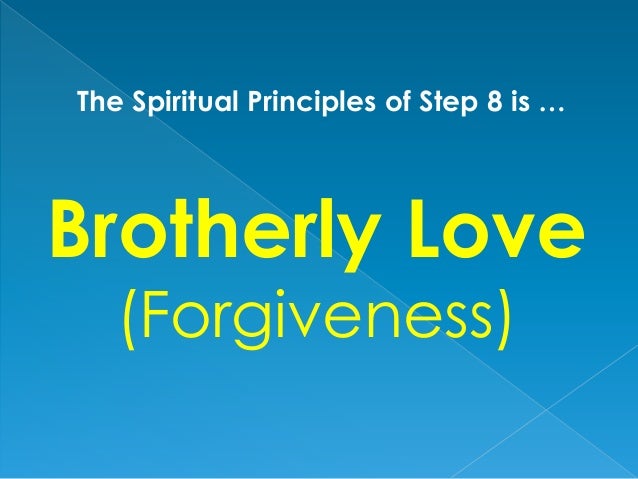Definition of Step Eight – Compassion: sympathetic pity and concern for the sufferings or misfortunes of others.
Synonyms of Step Seven – Compassion: pity, sympathy, empathy, understanding, care, concern, brotherly love, kindness, humanity, etc.
These notes are from recovery in AA and/or related 12 step programs.
Readers are encouraged to click external links for more detail.
We hope you find them helpful.
Love in fellowship.

Step 8: Made a list of all persons we had harmed, and became willing to make amends to them all. | More…
Remorse was one of the feelings that kept us drinking. The Eighth Step asks us merely to become willing to list and make amends to all those people we harmed.
As we become willing to clean up the damage we’ve caused, we acknowledge our readiness to change. We affirm the healing process of recovery. –Just For Today | More…

The Eighth Step offers a big change from a life dominated by guilt and remorse. It does not ask us to make right all of our mistakes, merely to become willing to make amends to all those people. As we become willing to clean up the damage we’ve caused, we acknowledge our readiness to change. –Just For Today | More…
The main thing the Eighth Step does for us is to help build awareness that, little by little, we are gaining new attitudes about ourselves and how we deal with other people.
To say “I’m sorry” probably isn’t such a foreign idea to most of us. Amending our behavior and the way we treat ourselves and others is the whole purpose of working the steps. We’re no longer just “sorry”; we’re responsible. –Just For Today | More…
All human beings struggle with self-centeredness. The variety of people we encounter in our day and the quality of our relations with them determines, to a great extent, the quality of our very lives.
Love, humour, excitement, caring—the things that make life worth living derive much of their meaning from being shared with others. Understanding this, we want to discover the true nature of our relationships with other people and mend whatever breaks we may find in those relations. We want to work the Eighth Step. –Just for Today | More…

… and became willing to make amends to them all.
One of the key words in the Eighth Step is the word all.
I am not free to select a few names for the list and to disregard others.
It is a list of all persons I have harmed. –Daily Reflections 09/08 | More…
The question arises of just what constitutes an amend. Many of us find that the old rationalization, ‘If I stay sober, that’s amends enough to those I have hurt,’ just doesn’t work. We have to be willing to go further. –June 1945, “On the Eighth Step,” Step By Step / Grapevine | More…
Carl Jung once said, “If one can accept one’s sin, one can live with it.
If one cannot accept it, one has to suffer the inevitable consequences.”
We must come to accept our past acts before they will stop causing us pain.
All the Steps help us do this, but in particular, Steps Four and Five (the inventory Steps) and Steps Eight and Nine (the amends Steps) help. If we attend to these Steps properly, we will no longer regret the past nor wish to shut the door on it. –Day by Day | More…

Whenever our pencil falters, we can fortify and cheer ourselves by remembering what A.A. experience in this Step has meant to others. It is the beginning of the end of isolation from our fellows and from God. –12 & 12 p.82 | More…
We consider how, with our newfound knowledge of ourselves, we may develop the best possible relations with every human being we know. As I face the Eighth Step, everything that was required for successful completion of the previous seven Steps came together;
Courage,
Honesty,
Sincerity,
Willingness
Thoroughness.
I could not muster the strength required for this task at the beginning, which is why this Step reads “Became willing. . . . ” I needed to develop;
The courage to begin,
The honesty to see where I was wrong,
A sincere desire to set things right,
Thoroughness in making a list,
And willingness to take the risk required for true humility.
With the help of my Higher Power in developing these virtues, I completed this Step and continued to move forward in my quest for spiritual growth. –Daily Reflections | More…

As I continue to grow in sobriety, I become more aware of myself as a person of worth. In the process, I am better able to see others as persons, and with this comes the realization that these were people whom I had hurt in my drinking days.
What were seemingly impersonal acts, were really personal affronts, because it was people – people of worth – whom I had harmed. I need to do something about the people I have hurt so that I may enjoy a peaceful sobriety.–Daily Reflections | More…
We resolutely looked for our own mistakes. Though a given situation had not been entirely our fault, we often tried to cast the whole blame on the other person involved.
We finally saw that the inventory should be ours, not the other man’s. So we admitted our wrongs honestly and became willing to set these matters straight. –As Bill Sees It | More… (p.222)
I learned to investigate those Steps and areas of my life which made me uncomfortable. As I faced the reality of the harm I had done, Step Eight took on a new meaning. I am no longer uncomfortable and I feel clean and light. –Daily Reflections | More…

We feel a man is unthinking when he says that sobriety is enough. We ask ourselves what we mean when we say that we have “harmed” other people. –As Bill Sees It | More… (p.227)
What kinds of “harm” do people to one another? To define the word “harm” in a practical way, we might call it the result of instincts in collision, which cause physical, mental, emotional, or spiritual damage to people.
Because of my drinking, I had “dropped out” – never sending cards, returning calls, being there for other people, or taking part in their lives. What a grace it has been to look at these relationships, to make my inventories in quiet, alone with the God of my understanding, and to go forth daily, with a willingness to be honest and forthright in my relationships. –Daily Reflections | More…
In many instances we shall find that though the harm done others has not been great, the emotional harm we have done ourselves has.
If a person, and the wrong done to him, keeps coming to mind, time and again, causing an uneasy or perhaps guilty feeling, then I put that person’s name at the top of my “amends list,” and become willing to make a sincere apology, knowing I will feel calm and relaxed about that person once this very important part of my recovery is accomplished. –Daily Reflections | More…

Very deep, sometimes quite forgotten, damaging emotional conflicts persist below the level of consciousness. Only through positive action can I remove the remains of guilt and shame brought on by alcohol.
Although I harmed others, some of my behavior caused grave wounds to my soul. Step Eight provides me with a way of forgiving myself.
I alleviate much of the hidden damage when I make my list of those I have hurt. In making amends, I free myself of burdens, thus contributing to my healing.–Daily Reflections | More…
Referring to our list [inventory] again. Putting out of our minds the wrongs others had done, we resolutely looked for our own mistakes.
Where had we been selfish, dishonest, self-seeking and frightened? There is a wonderful freedom in not needing constant approval from colleagues at work or from the people I love.
I wish I had known about this Step before, because once I developed a frame of reference, I felt able to do the next right thing, knowing that the action fit the situation and that it was the correct thing to do. –Daily Reflections | More…

Since defective relations with other human beings have nearly always been the immediate cause of our woes, including our alcoholism, no field of investigation could yield more satisfying and valuable rewards than this one.
Willingness is a peculiar thing for me in that, over a period of time, it seems to come, first with awareness, but then with a feeling of discomfort, making me want to take some action.
I felt forgiveness toward others after I became aware of my part in the difficulties of relationships. The beginning of the end to my isolation – from my fellows and from God – came when I wrote my Eighth Step list.–Daily Reflections | More…
The Eighth Step asks us to become willing to make amends to all persons we have harmed. We need to be willing to make our amends regardless of the outcome.
We can plan the amends, but we can’t plan the results. Although we may not be granted a full pardon by everyone to whom we owe amends, we will learn to forgive ourselves.
In the process, we will find that we no longer have to carry the burdens of the past. –Just For Today | More…

Made a list of all persons we had harmed . . .
Our Step Eight list must be as complete as we can make it.
As our recovery goes on we’ll remember others we have hurt.
We add them to our list.
By doing this, we heal even more.
This Step is for us, it is to help us stay sober. –Keep It Simple | More…
While we are preparing a list of those to whom we owe amends, it becomes time for the “golden rule”. It is important to begin treating others as we wish to be treated.
We must also learn not to judge others, but accept them for who they are, not our vision of who they should be. | More…

Bill W. considered each step to be a spiritual principle in and of itself. The most important of these is Humility.
Core Spiritual Principles of the Program: Willingness, Open-mindedness, Honesty. AA’s Code: Love and Tolerance of Others
The Principles of the Twelve Steps
Step One: Honesty
Step Two: Hope
Step Three: Faith (Surrender)
Step Four: Courage
Step Five: Integrity
Step Six: Willingness
Step Seven: Humility
Step Eight: Brotherly love
Step Nine: Discipline
Step Ten: Perseverance
Step Eleven: Awareness
Step Twelve: Service (Charity)
The relative success of the A.A. program seems to be due to the fact that an alcoholic who no longer drinks has an exceptional faculty for “reaching” and helping an uncontrolled drinker.
The heart of the suggested program of personal recovery is contained in Twelve Steps describing the experience of the earliest members of the Society.
The five principles of the Twelve Step Program are; membership requirement, spiritual basis, personal inventory, restitution, and helping others. | More…



